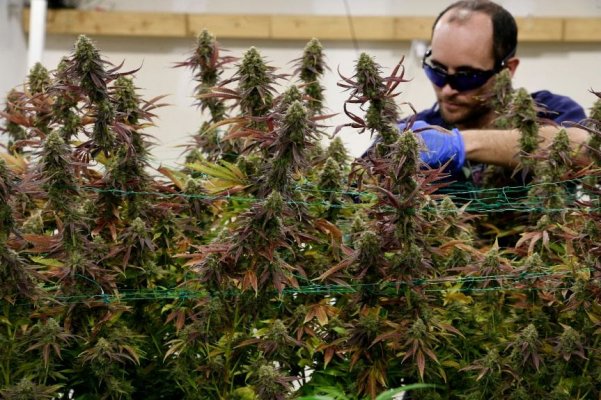In an effort to make Colorado’s cannabis industry more eco-friendly, the state’s health department and energy office launched two new pilot programs Wednesday focused on reducing carbon emissions and improving energy efficiency at local cultivations.
Both programs support Gov. Jared Polis’ mission to cut greenhouse gasses 50% by 2030.
For the first program, the Carbon Dioxide Reuse Project, the Denver Beer Co. is partnering with the Clinic dispensary to recycle carbon emissions. Brewing a 120-barrel batch of beer produces enough carbon dioxide naturally through fermentation to fill a 500-pound vessel, said Charlie Berger, co-founder of Denver Beer Co.
Using a carbon-capturing machine developed by Austin-based Earthly Labs, the brewery plans to provide its CO2 to the Clinic, which will, in turn, use it to stimulate plant growth at its cultivation operations.
Carbon dioxide is administered in growing rooms to promote plant health and increase plant yield during cultivation, said Max Cohen, founder and CEO of the Clinic. Using recycled resources reduces the dispensary’s need to buy manufactured carbon dioxide, which is usually transported by truck to the facility.
“We’re very serious about reducing our emissions,” said Polis at a news conference Wednesday. “We will leave no stone unturned, no beer tank unturned, no cannabis plant unturned in the climate effort because it’s that important.”
Earthly Labs’ machine, which is about the size of a refrigerator, captures carbon dioxide coming off the brewery’s fermentation tanks, purifies it through a three-step process and then chills it down to liquid form.
Denver Beer Co. expects to recycle more than 150,000 pounds of carbon dioxide using the technology — enough to meet 100% of the Clinic’s needs, said Amy George, founder and CEO of Earthly Labs. (The dispensary grows about 2,200 pounds of cannabis annually.) And she’s hopeful the technology could be adapted to other industries, from wine-making to logistics companies, in the future.
“This could be a road map for not only Colorado businesses, but for the nation,” George said.
The Colorado Energy Office hope the brewery-dispensary collaboration will inspire other cannabis companies to evaluate their environmental footprint, and is making resources available to them through the second program, the Colorado Cultivators Energy Management pilot.
Cannabis companies will be able to enlist the help of local electric cooperatives and utility companies to examine their energy use and ways to become more efficient. The free program will start with five utility providers — Mountain Parks Electric, San Isabel Electric Association, United Power, La Plata Electric Association and Colorado Springs Utilities — and 15 licensed cannabis cultivations in their respective service territories.
These assessments will help cultivators better understand what’s driving their energy use, their energy costs and help them understand cost-effective energy management opportunities, said Will Toor, the Colorado Energy Office’s executive director. They’ll also educate cultivators on renewable energy opportunities, including equipment and operating procedures, he added.
The pilot also provides free resources to any rural electric cooperatives interested in developing long-term strategies to improve cannabis cultivations’ environmental footprint.
Regulators declined to say how long the pilot programs would run for, but if they’re successful, they hope other businesses will adopt sustainable practices.
“It starts here, but sky’s the limit,” Polis said. “We want this to be a model in craft brewing and cannabis.”
Both programs support Gov. Jared Polis’ mission to cut greenhouse gasses 50% by 2030.
For the first program, the Carbon Dioxide Reuse Project, the Denver Beer Co. is partnering with the Clinic dispensary to recycle carbon emissions. Brewing a 120-barrel batch of beer produces enough carbon dioxide naturally through fermentation to fill a 500-pound vessel, said Charlie Berger, co-founder of Denver Beer Co.
Using a carbon-capturing machine developed by Austin-based Earthly Labs, the brewery plans to provide its CO2 to the Clinic, which will, in turn, use it to stimulate plant growth at its cultivation operations.
Carbon dioxide is administered in growing rooms to promote plant health and increase plant yield during cultivation, said Max Cohen, founder and CEO of the Clinic. Using recycled resources reduces the dispensary’s need to buy manufactured carbon dioxide, which is usually transported by truck to the facility.
“We’re very serious about reducing our emissions,” said Polis at a news conference Wednesday. “We will leave no stone unturned, no beer tank unturned, no cannabis plant unturned in the climate effort because it’s that important.”
Earthly Labs’ machine, which is about the size of a refrigerator, captures carbon dioxide coming off the brewery’s fermentation tanks, purifies it through a three-step process and then chills it down to liquid form.
Denver Beer Co. expects to recycle more than 150,000 pounds of carbon dioxide using the technology — enough to meet 100% of the Clinic’s needs, said Amy George, founder and CEO of Earthly Labs. (The dispensary grows about 2,200 pounds of cannabis annually.) And she’s hopeful the technology could be adapted to other industries, from wine-making to logistics companies, in the future.
“This could be a road map for not only Colorado businesses, but for the nation,” George said.
The Colorado Energy Office hope the brewery-dispensary collaboration will inspire other cannabis companies to evaluate their environmental footprint, and is making resources available to them through the second program, the Colorado Cultivators Energy Management pilot.
Cannabis companies will be able to enlist the help of local electric cooperatives and utility companies to examine their energy use and ways to become more efficient. The free program will start with five utility providers — Mountain Parks Electric, San Isabel Electric Association, United Power, La Plata Electric Association and Colorado Springs Utilities — and 15 licensed cannabis cultivations in their respective service territories.
These assessments will help cultivators better understand what’s driving their energy use, their energy costs and help them understand cost-effective energy management opportunities, said Will Toor, the Colorado Energy Office’s executive director. They’ll also educate cultivators on renewable energy opportunities, including equipment and operating procedures, he added.
The pilot also provides free resources to any rural electric cooperatives interested in developing long-term strategies to improve cannabis cultivations’ environmental footprint.
Regulators declined to say how long the pilot programs would run for, but if they’re successful, they hope other businesses will adopt sustainable practices.
“It starts here, but sky’s the limit,” Polis said. “We want this to be a model in craft brewing and cannabis.”




